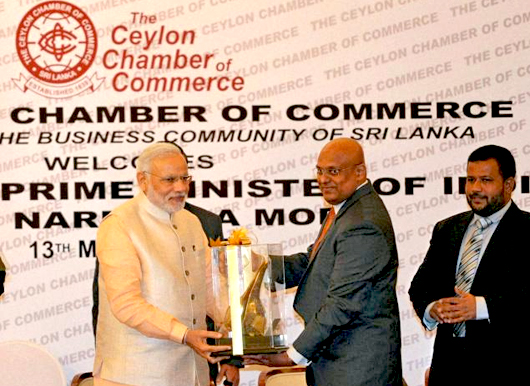Colombo, Mar 14: Prime Minister Narendra Modi has said global confidence in India has been restored and the world’s engagement with the country is at a “new level” even as he assured Sri Lanka that steps would be taken to address its concerns over the huge bilateral trade imbalance.
Mr. Modi said this while asserting that India and Sri Lanka should move “boldly” to conclude a long pending Comprehensive Economic Partnership Agreement (CEPA).

Stating that Sri Lanka has the potential to be India’s “strongest economic partner” in the region, Modi said it should not worry about India’s economic size.
In his address to Sri Lanka’s business community at the Ceylon Chamber of Commerce in Colombo on Friday night, the Prime Minister acknowledged that there were concerns in Sri Lanka about the huge trade imbalance.
“I am prepared to work with you to address them. I want balanced growth in trade. We will try to make it easier and smoother for you to access the Indian market,” he said on the first day of his two-day visit to the country, the first by an Indian Prime Minister since 1987.
Sri Lanka is India’s major trading partner in South Asia.
The bilateral trade between India and Sri Lanka in 2013-14 was $5.23 billion with Indian exports amounting to USD 3.98 billion and Sri Lankan exports amounting to $678 million.
“I often say that a nation’s fortunes are linked to its neighbourhood. There are many in India who would argue that India is too large to need her neighbours.
“There are many in our region who worry that India’s economic size will hurt them. I disagree with both views. For one, we all need a stable and peaceful neighbourhood to concentrate on national development,” he added.
“There are already powerful examples in South Asia that show us that differences in size is no constraint to beneficial partnerships, if we use our strengths and seize our opportunities”.
The Prime Minister said India is opening up to the world and have Free Trade Agreements with ASEAN and others.
Underlining the need to expand the ongoing Free Trade Agreement (FTA) that was signed in December 1998, Modi said India will take all necessary measures to ensure that Sri Lankan goods enter Indian markets smoothly.
“We should ensure that Sri Lanka does not fall behind in the changing and competitive world. That is why India and Sri Lanka should move boldly to conclude a Comprehensive Economic Partnership Agreement,” he said.
“You should also attract investments from India for exports to India. That should be the natural outcome of our proximity and your strengths,” he added.
Chairman of the Ceylon Chamber of Commerce Suresh Shah while referring to the already existing Free Trade Agreement between Sri Lanka and India said, “CEPA has been on the backburner in Sri Lanka. This is partly due to politics and partly due to concerns on the part of some sections of the Lankan business community who perceive a playing field tilted in favour of their Indian counterparts.”
Sri Lanka’s President Maithripala Sirisena while addressing local Sri Lankan businesses recently said, “I want to assure you that I will not enter any agreement with any country that will be harmful to our businesses.”
The CEPA begun initially in 2003 is yet to be implemented by Sri Lanka and India. The majority of the Sri Lankan business community and professional bodies were not convinced about the benefits from a CEPA. They were of the opinion that a bilateral agreement between a small country and a large country is bad news for the small country.





Comments
Add new comment